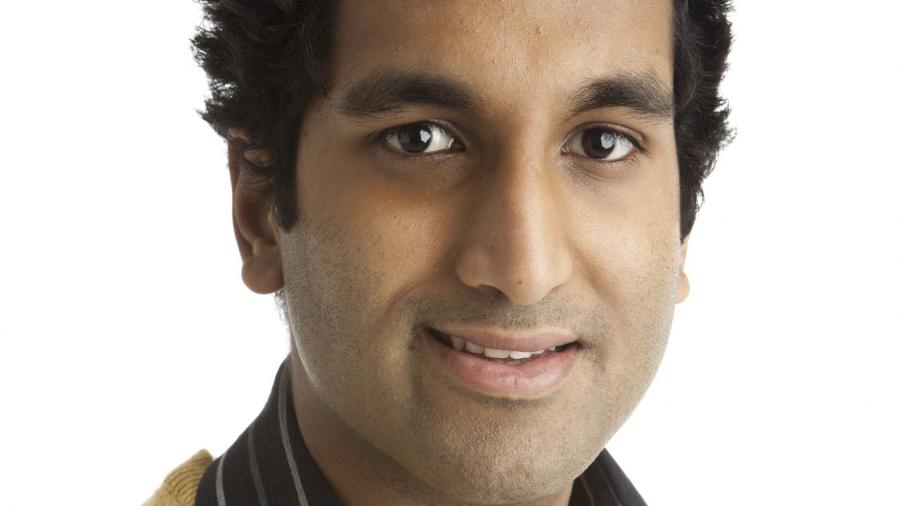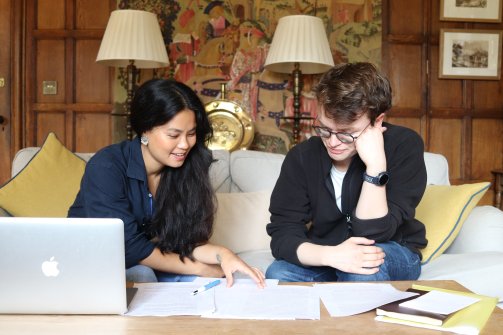The politics of time with Carolyn Smith

After nearly two decades in medicine, Zeshan Qureshi returned to university this year on a mission to explore how race relates to healthcare and medicine.

As an MPhil student in Health, Medicine, and Society, Zeshan is exploring highly topical and indeed highly charged questions. The experience of COVID-19 has brought many of the health inequalities for black and minority ethnic groups into focus, and low vaccination take-up has spotlighted historical and contemporary issues in healthcare provision amongst ethnic minorities.
By focusing his research on vaccine take-up amongst ethnic minorities, Zeshan’s work will undoubtedly cast new light on these pressing issues.
He has also published two articles already this year, with a third upcoming. The latest, Addressing racist parents in a paediatric setting: the nuance of zero tolerance policies, argues that healthcare professionals need clearer guidance on responding to racism in paediatric settings. The arguments, persuasive and revealing, were greeted positively by the Royal College of Paediatrics and Child Health, who stated that they would “reflect on the recommendations and look to see what more we and other organisations can do to take forward the steps needed to make a difference.”
Zeshan co-edits the Oxford Textbook of Global Health of Women, Newborns, Children, and Adolescents, along with 14 other books, and he has been a winner of the BMA Young Author of the Year and the New Leader Award from the Association for the Study of Medical Education. He is also a wellbeing advocate for doctors, and delivered a passionate TEDx talk in 2018, addressing how ‘Our healthcare systems are making doctors mentally ill’.
Following the recent publication of his article in the BMJ, we spoke to Zeshan about returning to university, racism in a paediatric setting, COVID-19 vaccines for younger children, and why communicating research and ideas to a wider audience is so important.
It’s been almost 20 years now since I first started medical school. I've really enjoyed being a doctor and particularly looking after children. However, I've realised medicine is not as objective as we'd like to think it is. Much like anything, it is influenced by our underlying beliefs and values. How race relates to health is an issue that has been neglected. Understanding why seems to be more of a social sciences question, rather than a basic science one. I want to start at the beginning, and really get to grips with this important debate. The main question I want to look at is around vaccines - why is there a lower uptake of vaccines amongst ethnic minority children, and what can be done to improve this?
It is inevitable in my view that the COVID vaccine is going to be extended to younger children, and it might even be the case that like the flu vaccine, it becomes an annual vaccine in those at risk. There is already a low uptake of the COVID vaccine amongst both children and ethnic minority communities. There are some strategies that seem to have been effective in increasing update in ethnic minorities so far, like for example engaging with local community leaders and using local places of worship as vaccination centres. I am looking to really examine the question at a granular level, but core to everything seems to be rebuilding trust in these communities.
It has become increasingly recognised that paradoxically healthcare systems can make people sick, including their staff, with mental health issues being particularly problematic. More people are talking about it than ever before, and to be fair, this has led to more services being accessible to healthcare professionals than ever before. However, the COVID pandemic has led to an unprecedented demand on staff, meaning that mental health challenges have escalated. I helped run a wellbeing centre in the hospital for staff during the pandemic; people were carrying so much pain and there is a lot that still needs to be done to address it.
The number of resources available is vast. Many hospitals offer free and confidential counselling services. Services also exist regionally and nationally for more long-term support, for example through the Practioner’s Health Programme or the BMA. Doctors themselves have generated their own support groups, with Tea and Empathy being one of the biggest ones on social media; it never fails to amaze me the level of support healthcare professionals are willing to give each other. The biggest thing we need though is not more help dealing with mental health problems, but interventions to reduce the causes of the mental health problems in the first place. Optimising staffing and resources in healthcare settings is key to this to stop staff feeling overworked and ineffective.
Racist people exist everywhere, and we need to understand how to address that in a way that shows clear rejections of racist beliefs, but which does not cause harm in other ways. The setting in paediatrics is challenging, because it involves a sick child who isn’t the one harbouring the racist beliefs. How to address racism in the parent, and ensure their child gets optimal medical care, is the challenge we have to think about carefully. Our BMJ article is the beginning of this debate, but there is much more work to be done.
Yes. Racist beliefs are extremely deeply held, and it’s unsurprising that those who hold them do not feel comfortable with certain individuals looking after their children. I've been rejected as a carer because of my ethnicity. We need to accept this reality in order to be able to address it.
Lots of guidelines are emerging to tackle various elements of racism in teaching, research and healthcare. What there isn't, however, is a specific set of guidelines on how to deal with a parent that comes into hospital demanding a doctor of a specific ethnicity. The feedback I've got from colleagues is that having such guidelines would make it a lot easier to stand up to racism, whilst at the same time being reassured that staff will be supported by their regulators and employers in their actions.
What alarmed me when researching this paper was the extent to which ethnicity negatively affected health at so many different stages. From the initial risk of illness to the likelihood of getting appropriate investigations and treatment, being from certain ethnic groups disadvantaged children across many countries. It surprised me that often doctors were making decisions whereby children with the same illness would be treated differently, if they were in a certain ethnic group. This felt deeply uncomfortable to me, as doctors are supposed to be objective and prioritise care based on need.
We know there is a problem with disparities in child health based on ethnicity. What we don’t know is the exact extent of the problem, and how it manifests in individual healthcare settings. For me, a priority would be to create audit tools that could be used across paediatric departments to capture any problems locally, and to subsequently empower Paediatricians to improve healthcare for ethnic minorities in their communities. The nature of the problem will vary in different parts of the country and there will of course be some centres with incredible multi-ethnic care that we can all learn from.
I was honoured to meet Adam Rutherford at his lecture and to have dinner with him and others in the field afterwards. What was really powerful to me was getting to grips with the underlying history of race, its lack of links to independent biological categories, and how it has persistently been misunderstood using pseudoscience. We have a duty to be anti-racist, and as scientists, to be able to tackle scientific myths that underpin a lot of racist ideology.
Science communication is so important today and social media in particular has allowed us to reach much wider audiences than ever before. How to tackle racism is not just a debate for academics; everyone's voice matters and so it is crucial that we have a public discussion about key issues around it. Many questions are deeply value-based and require an understand of people's lived experiences. If you restrict yourself to academic circles, you miss out on the important human experiences of racism that need to be understood in order to develop meaningful, relevant solutions.
You can follow Zeshan on @Drzeshanqureshi.







